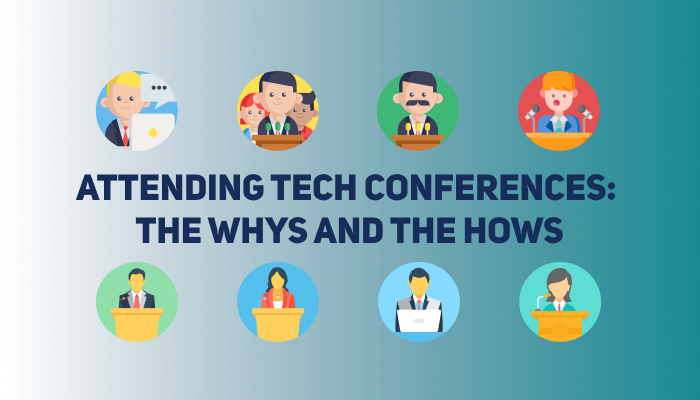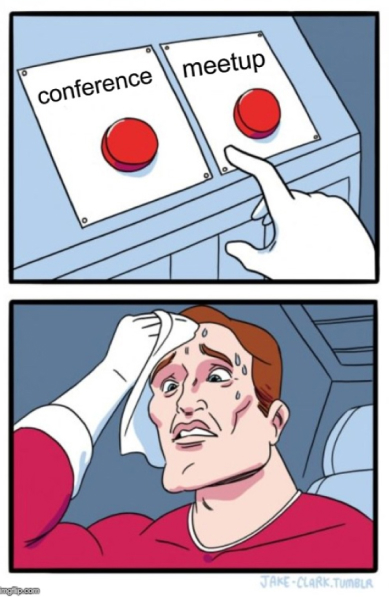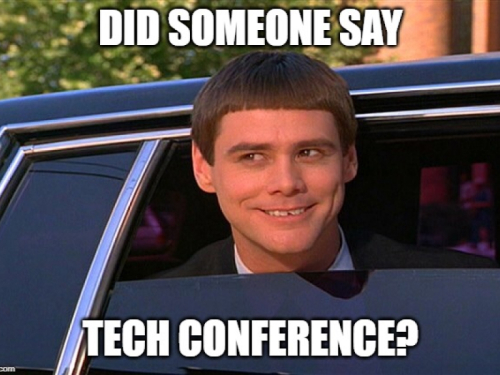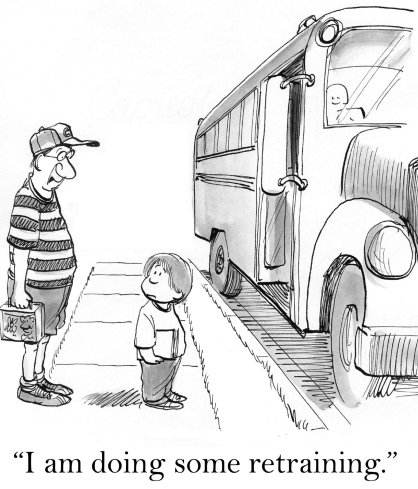
I have a few pieces on conferences that I did and didn’t attend, so before you embark on a journey of reading all the pros and cons, consider checking those out and see some of the amazing pictures and all the excitement for yourself.
Tech conferences and meetups are currently in fashion: the hundreds of attendees scurry around to occupy the best seats, confident developer advocates take the stage by storm, cracking jokes while live-coding and showing off some of their mastermind apps, while other less known speakers bite their nails for the fear of public speaking behind the stage — the show is totally worth observing. But do you really need to spend your time and money on those developer pageants? Let’s find out.

What is a tech conference?
Before we talk on the pros and cons of attending a tech conference, we’ll briefly describe what a tech conference is and what it implies.
Depending on the purpose and the intended audience of an event, there are quite a few kinds of tech conferences: some might be small and less formal, others, on the contrary, are huge several-day events with speakers strewn across the vast expanse of conference space, which might be several buildings across different neighborhoods of a city.
Most of the conferences are sponsored by or partnered with other organizations that help them defray some of the costs associated with organizing such events — that’s exactly why you’ll be exposed to hearing different names of the companies throughout the event, and seeing their logos on the merchandise you receive when you enter and check yourself in the conference space.
Nevertheless, differentiation between conferences goes even further: some conferences are put by large tech companies for their customers — these are usually huge events with extravagant parties and lost of workshops on using that company’s particular products, and DJs and stars performing on stage and high profile keynote speakers. An example of those might be Google I/O event held on May 7-9 this year. Other conferences are usually subject-centric, meaning they cover a particular technology or topic, like security, Android or iOS development, React or Vue or Angular. Examples: PyData (Python) and JS Nation (JavaScript). And even then, they do vary by size, cost, organizers, communities. Some are even less formally organized and supported by dedicated volunteers with very little amenities and merch depending on the sponsors if any. Example: AltConf

Depending on what you’re really looking for, there’s a chance that there is an event just for you out there.
What you might be looking for by attending a tech conference:
- You’re in-between jobs — you need to put conference attendance on your resume, as well as network and potentially connect with prospective employers;
- You have questions — you want to ask those questions to fellow developers and speakers;
- You want to learn new things, get fresh perspectives — you sit through all the talks jotting down new information;
- Your company sends you — you need to learn a new skill or advance in your career by learning new technology;
- Your company sponsors an event — you need to sell or represent its products;
- You just want to hang out — network within the community and meet new people.
Why attend a tech conference: pros vs cons

Let’s start with the disadvantages, because there are quite a few, surprisingly.
First and foremost, it’s the price. Conference attendance can be quite pricey, ranging from a few hundred dollars to a thousand. Usually, the price range falls in-between 350 and 600 dollars. Add to this the cost of travel or commuting, time away from the office, missing opportunities (really?), and you’ll have a sum close to one grand.
There’re a few things you can do about minimizing the cost of attendance: first, ask your employer to sponsor your ticket (partially or fully), take a paid leave, book in yourself early, purchase early bird tickets, or sign up at the event as a volunteer (this way, you don’t have to pay at all, but you’ll be expected to help the organizers with various types of menial labor tasks ranging from loading and unloading conferences facilities, devices, even sweeping the floor (well, maybe not this one)).
The other cons include the time you spend on the conference, failure to derive any value from the talks, and missing opportunities for choosing this event rather than attending the other. All of these issues can be addressed with proper proactive and timely planning, which we’ll address in the next section.
As for the pros, there are quite obvious: events are rife with opportunities to learn new skills or features of a particular product or technology; all attendees have a fantastic opportunity to mingle and chat and network; you’ll finally meet numerous people from the community including those posting on Twitter, committing to open source, famous maintainers, developer advocates, tech leads of huge corporations — all those you’ve been meaning to see in person, anyway. All of the pros described above make conference attendance super exciting and worthwhile.
What to do if you decide to attend: a plan of action
We’ll divide the approximate plan of action into three separate stages: before, during, and after the event.

Before the event
The first step is to consider at least a dozen events that suit your profile, the line of work, or just seem interesting and educating. Across each upcoming event write down the date, location, subject, costs, and your anticipated goals. For example:

Then narrow down the list of events to three or more the most important ones, where you can afford both the travel and the cost of the ticket; compare the costs to the anticipated results or goals you plan to fulfill by attending the event; in short, conduct a thorough cost-effective analysis.
After you’ve conducted your initial research and narrowed down the events you can afford, read the reviews of those events or ask your community around for feedback or suggestions.
Now, you should have been left with only a few options to choose from.
Write down a list of speakers for each chosen event along with the topics they speak on or workshops they conduct, the value you anticipate to derive from those talks, and the possible questions you might ask the speakers. For example:

There should be one conference left by now which you’ll definitely attend.
Next step will be developing your learning plan with your goals, expectations, schedule, table of contents with talks, and your takeaways under each one that you plan to attend. For example:
My goals:
1. Getting the best insight into the advanced GraphQL and learn how to build GraphQL client
2. Attend all talks
2. Connect with the key people
How will I know I have achieved these goals?
1. If I attend a GraphQL workshop
2. If I attend all the talks and ask the right questions
3. If I connect with at least 5 key people
Table of contents:
Schedule of talks: Time – Talk – Venue
Then dedicate a separate sheet of paper to each talk you plan to attend and jot down your goals of attending the talk and questions you’d like to ask.
During the event

During the event maximize your chances at achieving all the goals you’ve set for yourself earlier. First of all, fill out your learning plan as detailed as possible, make videos, and take pics of the slides (even if they are going to be released afterward). Most importantly, get inspired by the talks and skills of others. Network and look for opportunities to make meaningful working connections with both fellow developers and speakers. Ask questions and help others.
After the event
After the event, connect with the people you’ve got acquainted with on social media; write about the event as soon as possible to remember your key takeaways and inform and help others. Most importantly, apply the knowledge you’ve gained from the event.
Conclusion
In case you’re looking for conferences to attend, these are a few suggestions for you:
My colleague’s list on TOP 5 JS conferences in 2019
Conferences’ we’ve recently partnered with:
React Advanced
React Day Berlin
Past conferences:
Node Ukraine
JS Nation
Running Remote
And what conferences do YOU plan to attend in the nearest future?






